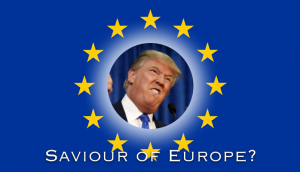Strategy: go direct or indirect?
In strategy it is important to focus. In practice this often means that we take a direct aim at the objective. This is, however, not always a winning strategy. There are situations in which y ou need to take a step to the side first, before charging straight towards your objective. Sometimes you may even have to do the exact opposite and work against your own intuition; that’s tough.
ou need to take a step to the side first, before charging straight towards your objective. Sometimes you may even have to do the exact opposite and work against your own intuition; that’s tough.
For example…
A few weeks ago there was a lot of fuzz in the Dutch media. One of our Members of Parliament quitted and moved to the US in order to support Hillary Clinton in her campaign. I don’t want to elaborate on the many possible reasons, opinions, etc. I am going to build a hypothetical scenario based on it. This is about scenarios, not opinions.
Suppose you are a member of parliament somewhere in Western Europe. As an elected representative of the people your objective is to increase the success of the EU and your own country. You observe the events ahead of the upcoming elections for the next president of the USA. You see how the conservatives are struggling with Donald Trump. You envision several options and one scenario has Donald Trump as the next president of the USA. The question for each scenario, including this one, is what will the effects be? It may have an effect on how the US goes about its foreign policy and that will have a direct effect on you. You may not like the prospect. But there may be indirect effects as well.
We see the rhetoric of Trump moving opinions and emotions more to the extremes. History is full of situations where in case extremes rise to power it results in many people moving out, in particular highly educated people. That might be the US side of the story. There is of course also another side to such a story because when you move out of a country you also move into another. So where would highly educated Americans go? Canada could be an option, but also the EU. An influx of highly educated Americans is certainly a big upside for any western country.
So coming back to the Member of Parliament who quit and moved to the US. You may do that in order to help Hillary Clinton become the first female president of the USA – out of ideology. You may do it in order to help prevent Donald Trump becoming president of the USA – out of fear. You may also do it to help the EU, and for that it may be better to go and join the campaign of Donald Trump.
You are likely to have an opinion on this and have a feeling on how you would look at yourself doing this. But my aim is to just describe a crisp hypothetical example in order to illustrate indirect scenarios in strategy.
Jam-Willem Boots is co-founder of Changing Games



